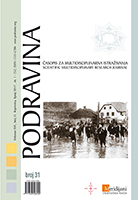- KATASTROFALNE POPLAVE U KOPRIVNIČKOJ I ĐURĐEVAČKOJ PODRAVINI 1965., 1966. I 1972. GODINE
- MUZEJ – MOST RIJEKE DRAVE KOD BOTOVA
- NARAVNI ČISTILNI SISTEMI KOT INOVAVITNI PRISTOPI ZA ČIŠČENJE VODE NA PRIMERU ČEZMEJNEGA OBMOČJA MED MURO IN DRAVO – GAJŠEVSKO JEZERO
- BATHING IN THE DRAVA – »GOING WITH THE FLOW«
- POSJED SVETI MARTIN/ FELSE SZENT MARTON/ MARTINCI – DJELIĆ STARE SLAVONIJE S DRUGE STRANE RIJEKE DRAVE
- RIJEKA DRAVA I NJEZINA PRITOKA MURA KAO ZAVIČAJNE, GRANIČNE I MITSKE VODE U TRADICIJSKOM PJESNIŠTVU MEĐIMURJA I SUSJEDNIH KAJKAVSKIH PODRUČJA
- PROSTORNI RAZVOJ VIKENDAŠTVA U RURALNIM PODRUČJIMA HRVATSKE: PRIMJER KOPRIVNIČKOKRIŽEVAČKE ŽUPANIJE
- REGIONAL POLICY IN THE EASTERN SLOVENIA COHESION REGION - INNOVATIVE OPEN TECHNOLOGIES (SMART SPECIALIZATION)
- RANGIRANJE OPASNIH DIONICA CESTOVNE MREŽE MEĐIMURSKE ŽUPANIJE AHP METODOM
- PRIRODNOGEOGRAFSKE ZNAČAJKE BJELOVARSKOBILOGORSKE ŽUPANIJE U FUNKCIJI RAZVOJA TURIZMA
- TURISTIČKOGEOGRAFSKI PRISTUP U VALORIZACIJI KULTURNE BAŠTINE
- PROGRAM MLADI ČUVARI PRIRODE MEĐIMURJA - POZITIVAN PRIMJER EKOLOŠKE EDUKACIJE UČENIKA
- PRIKAZI NOVIH KNJIGA, ČASOPISA I ZNANSTVENIH SKUPOVA
- BIBLIOGRAFIJA RADOVA ČASOPISA PODRAVINA 2002. - 2016.
- UPUTE SURADNICIMA
REGIONAL POLICY IN THE EASTERN SLOVENIA COHESION REGION - INNOVATIVE OPEN TECHNOLOGIES (SMART SPECIALIZATION)
Development initiatives are generated in the local environment. The ideas are being networked and this process includes policies of different economic sectors on a multi-institutional level. Awareness and recognition of local values, ecological, cultural and social ones, is the main motivational factor in local communities when setting up development projects. Knowledge has become crucial for regional, innovation and development processes. The endogenous growth theories as well as the quadruple helix concept emphasize the role of institutions of knowledge, not only in the creation of knowledge and ideas, but also in their transfer into practical use. Scientific and research institutions as well as educational institutions play an indispensable role in contributing to the economic development and technological advancement of regions. In the case of the transfer of knowledge and scientific findings into practice, it is necessary to proceed from the whole complex of economic, social and ecological conditions for development. Knowledge institutions participate in solving global challenges and contribute to the economic and technological development and social progress of local communities and regions. The goal of the University of Maribor is to develop an innovative ecosystem, which will create a symbiosis among the University, the economy and the local communities through open innovations and technologies, and through the creation of knowledge for new professions. The capacity of regions to support learning and innovation processes is a key source of competitive advantages. Human capital is essential driver of regional innovation. Innovation is not merely about technology – it is about change in human behaviour.
Izvorni znanstveni rad / Original scientific paperMaruša VERBIČ KOPRIVŠEK

